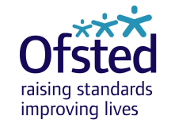Ofsted’s education inspection framework
ALLFIE responded to the consultation. Are the proposals style over substance?
 Last month, ALLFIE submitted a response to an Ofsted consultation centred around changes to Ofsted’s inspection framework, including the substance and quality of education, the curriculum and pupils’ personal development.
Last month, ALLFIE submitted a response to an Ofsted consultation centred around changes to Ofsted’s inspection framework, including the substance and quality of education, the curriculum and pupils’ personal development.
- To what extent do you agree or disagree with the proposal to introduce a ‘quality of education’ judgement?
Ofsted proposes to holistically examine the quality of education and explore the substance of the curriculum. ALLFIE immediately noticed that the first question failed to inspect inclusive education. Whilst ALLFIE welcomes Ofsted’s perspective on curriculum flexibility, we were surprised that they failed to mention how they were planning to make the curriculum more accessible and inclusive for Disabled pupils. The question also overly focuses on academic subjects and disregards preparing young people for life in the community, or preparing schools to be inclusive.
ALLFIE also wants the quality of education to mean that Disabled pupils are not on segregated courses in mainstream educational settings; this is integration, not inclusion. The consultation also mentions inspecting leadership; in ALLFIE’s view, if Disabled students are in segregated lessons, judging good leadership should be part of the criteria.
- To what extent do you agree or disagree with the proposed separation of inspection judgements about learners’ personal development and learners’ behaviour and attitudes?
Ofsted wants to judge pupils’ personal development separately from their behaviour and attitudes. ALLFIE believes that behaviour policies are used to segregate Disabled pupils within mainstream schools. During the House of Commons Education Select Committee enquiry, the legality of zero-tolerance behaviour policies was questioned. Under the Equality Act 2010, schools must make reasonable adjustments for pupils. ALLFIE states that by judging pupils’ behaviours and attitudes, schools may not want to accommodate pupils with challenging behaviour, fearing that this will discourage Ofsted from giving them a “Good” or “Outstanding” rating. ALLFIE instead wants Ofsted to focus on pupils’ wellbeing.
Seven Sisters Primary School, for example, has a positive relationships policy and not a behaviour policy, and is an excellent example of focusing on pupils’ wellbeing. Art therapy and PE are used to develop cooperation skills among pupils, and quiet rooms are available. Furthermore, pupils can take part in activities such as mindfulness. ALLFIE was pleased to discover that Ofsted wants to include off-rolling and attendance data as part of their grading criteria. However, solicitors have questioned attendance awards; Disabled pupils may need time off due to medical conditions, placing them at a disadvantage, particularly if their attendance is used as part of Ofsted’s grading process.
Similarly, ALLFIE wants Ofsted to clearly define inclusive education and inclusive practices. In ALLFIE’s experience, schools often falsely claim they are inclusive. For example, there are no guidelines for teaching a fully inclusive curriculum. Consequently, ALLFIE recommends that Ofsted use our definition of inclusive education.
- To what extent do you agree or disagree that the proposal to reduce the types of provision we grade and specifically report on will make our inspection reports more coherent and inclusive?
Fortunately, Ofsted will now adequately represent SEND provision within their report. Instead of separating 16 plus provision into various categories, they will now have three: education programmes for young people, apprenticeships and adult learning programmes.
ALLFIE is concerned that Disabled pupils in mainstream education are being segregated aged 16 plus. In 2016, ALLFIE found that the majority of 16 plus students in mainstream education with learning difficulties were on segregated courses; this is not inclusive practice, despite it being part of Ofsted’s criteria for judging good leadership. ALLFIE also wants Ofsted to check whether schools use inclusive assessments for Disabled pupils, as well as allowing schools to find ways of capturing the achievements of pupils who cannot participate in formal assessments. We understand that GCSEs, SATs and phonics measure students’ progress, but they may not accurately capture Disabled pupils’ development.
I believe that even though Ofsted says that it wants to inspect the quality of education, to do this when they have not clearly defined inclusion would be difficult. If Ofsted fails to release guidance on inclusion, Disabled pupils will remain disadvantaged.
Similarly, Ofsted needs to understand that many Disabled pupils that exhibit challenging behaviour are doing so because of unmet needs. Ofsted should examine teachers’ response to such pupils and whether this could further exacerbate these behaviours. If Ofsted wants to ensure that such pupils are included, they need to inspect other aspects of behaviour, not just reward and punishment.
Until Ofsted addresses school practices that disadvantage Disabled pupils, it is difficult to know whether the new Ofsted framework will achieve its goal. Ofsted must clearly define inclusive education; making inclusive education the main focus of their inspection criteria will help not only Disabled pupils but all pupils.
Yewande Akintelu-Omoniyi
ALLFIE Volunteer
![Allfie [logo]](https://www.allfie.org.uk/wp-content/themes/allfie-base-theme/assets/img/allfie-logo-original.svg)



